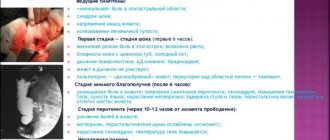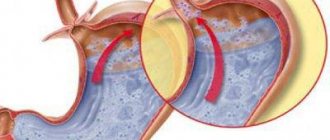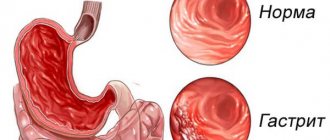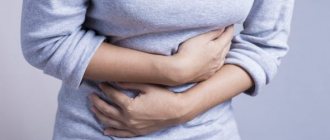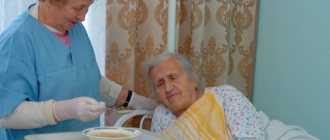Causes of bleeding from stomach ulcers
Food that enters the stomach is digested in it using gastric juice - a mixture of mucus, enzymes and hydrochloric acid, which can dissolve any living tissue.
Mucus is located on the walls of the stomach and protects it from hydrochloric acid, that is, it maintains the integrity of the stomach.
What do enzymes and hydrochloric acid do? Enzymes break down proteins and fats, and hydrochloric acid breaks down sugar, protein residues and destroys microbes. This is the process of digestion.
When the process is complete, the digested food passes into the duodenum, into which the intestinal sphincter (valve) allows it to pass.
When the stomach lining is damaged, the stomach wall becomes exposed. The protective layer is damaged and an ulcer forms in its place. There are many reasons leading to this defect. But we will look at the disease itself, or rather exacerbations, which can even be fatal.
Causes of stomach bleeding, symptoms
An ulcer is a deep wound in the wall of the stomach (it can also form in the intestinal wall and duodenum). If the ulcer is not treated, it will grow over time and affect the vessels that feed the walls of the stomach.
Such an ulcer may open. Bleeding usually occurs unexpectedly. Factors that prompted this phenomenon could be cigarettes smoked on an empty stomach, coffee, or stress.
Signs by which internal bleeding can be determined with a stomach ulcer are dizziness, cold sweat, sleepiness, increased heart rate, and a feeling of panic.
The patient has a desire to vomit due to the fact that blood is collected in the stomach from the bloodstream. Gastric blood is dark in color - the color of coffee (hydrochloric acid affects the color).
When the opened vessel bleeds slowly, the blood has time to pass into the intestines, then the feces become black.
In this case, a person experiences pain - acute with bleeding from the stomach. In addition to small vessels, there are also large ones; if the ulcer reaches them, then in a short amount of time the patient loses a lot of blood, which can lead to death.
If you suspect internal bleeding in the stomach, you should urgently call an ambulance. Now there are many progressive treatment methods, and doctors have begun to use less surgical methods - surgery.
But we must remember: if bleeding once started due to a stomach ulcer, it can happen again.
Treatment of ulcer bleeding
There are two main types of treatment for gastric bleeding: conservative and surgical. The first is used if the patient belongs to a high-risk group (old age or the presence of other serious diseases), as well as with mild and moderate blood loss. The conservative method includes a number of the following therapeutic measures:
- transfusion of blood or its individual components (for example, plasma or red blood cells);
- intravenous administration of aminocaproic acid, atropine, fibrinogen, calcium chloride;
- intramuscular injections of vikasol.
In the first three days of hospitalization, complete fasting is prescribed to stop bleeding. Further in the treatment process, doctors recommend adhering to the Meulengracht diet.
Surgery is performed in the following cases:
- extensive blood loss;
- ulcer penetration;
- rapid deterioration of the patient's condition.
Depending on individual characteristics and concomitant pathologies, the doctor can choose the most appropriate method of surgical treatment. The following types of operations are most often performed:
Gastric resection
This operation involves partial removal of the affected area of the upper or lower stomach with the possibility of restoring normal functioning of the gastrointestinal tract. If there is a need to completely remove the organ, a total gastrectomy is performed.
What to do if a stomach ulcer opens with bleeding
Treatment must be carried out in a hospital, where gastroscopy is performed, and with the help of special medications and suturing of ruptured vessels, a person’s life is saved.
The patient is placed on a drip and given special medications that reduce the production of hydrochloric acid.
Before the ambulance arrives, it is necessary to provide first aid to the patient.
Strict bed rest must be observed. Remove the pillow from under your head.
To stop vomiting, you can administer one of the following medications:
- Diphenhydramine,
- Cerucal,
- Torekan,
- Vikasol,
- Protamine,
- Novocaine.
You can put an ice pack on your stomach to stop bleeding, or you can swallow a piece of ice.
What to do first
If the patient exhibits the first clinical symptoms of bleeding from the stomach or duodenum - vomiting, blood in the stool, treatment must begin immediately. Stopping bleeding can prevent tragic consequences for the patient.
The first step in helping a patient with suspected gastric ulcer bleeding is to immediately call an ambulance.
Pre-medical stage
While waiting for the medical team to arrive, it is necessary to provide the patient with emergency assistance:
- Ensure absolute peace and immobility.
- Lay the victim on a flat, hard surface. If there is a suspicion of an ulcer complicated by bleeding, the patient is transported exclusively in a horizontal position on a stretcher. Place a pillow or blanket under your feet to elevate your feet. This helps increase blood flow to the head, prevents brain hypoxia and loss of consciousness. Any physical activity, even minimal, can dramatically increase the intensity of bleeding.
- It is unacceptable to give food or water to the patient. Food and water can stimulate gastric motility, increasing blood loss.
- It is recommended to apply cold to the epigastric area. Use a heating pad with ice, frozen food from the refrigerator, or a bottle of cold water. Applying cold is allowed for 15 minutes, then remove for 3 minutes and apply again. Cold helps to constrict blood vessels, which can stop bleeding.
- You should not try to rinse the patient’s stomach or give him medications. For bleeding from the stomach, treatment is prescribed exclusively by doctors.
- It is advisable to keep the patient clearly conscious until the ambulance arrives. For this purpose, keep a cotton ball soaked in ammonia at the ready.
Emergency medical care
At home, the arriving team provides emergency care. The patient is given to take 1-2 tablespoons of an ice-cold solution of aminocaproic acid orally. The drug exhibits hemostatic properties.
A teaspoon of calcium chloride and 2 tablets of dicinone are given to drink internally. It is better to crush the tablets before giving to the patient.
There is a known method of swallowing pieces of ice to stop bleeding. Opinions differ regarding this method of stopping bleeding. On the one hand, cold promotes vasoconstriction. On the other hand, swallowing movements can provoke increased bleeding.
What is perforation of an ulcer
Perforation of an ulcer is the leakage of contents into the abdominal cavity. The disease manifests itself immediately, in an instant.
To better understand what it is, you need to imagine a wound that has gone so deep that it has pierced the wall of the stomach, and all its contents are directly connected to the peritoneum. This is accompanied by severe, unbearable pain caused by the acidic contents of the stomach. This phenomenon also happens unexpectedly.
The patient, bent over, feels severe pain in the navel and upper abdomen. If you do not provide such a patient with medical care, the disease will very quickly develop into peritonitis (purulent inflammation of the abdominal cavity), and the patient may die.
Possible consequences
Internal bleeding of any type is dangerous to human life and health. If such a process occurs in large quantities, then there is a risk of death. With scanty but constant bleeding over a long period, a person’s life becomes unbearable. It becomes impossible to do usual things, as weakness is felt, attention is impaired, and problems with sleep appear.
After some time, a fear of bright light begins to develop, and dizziness is felt during the day. Internal organs are no longer saturated with the required volume of blood, which negatively affects their functions. The man is slowly dying. In this case, medical assistance should be provided immediately.
If the disease is detected in a timely manner, when blood loss is mild or moderate, correctly prescribed therapy can give a positive result. A person is given a special gentle diet that reduces the load on the digestive system and activates internal regeneration processes. In more advanced forms, surgery is performed and medications are prescribed.
Consequences of bleeding from a stomach ulcer
According to statistics, ulcerative bleeding occurs in patients who have erosions of the gastric mucosa. And it always arises unexpectedly, suddenly. This is very dangerous, and help should be provided by doctors.
Bleeding from a stomach ulcer will not stop on its own (it may stop for a while), since a scar forms at the place where the blood flows out, which is unable to heal. And for this reason, medical attention is required.
Constant loss of blood leads to anemia, the patient develops iron deficiency, as a result of which the body becomes very weak, and then the patient is placed in intensive care to carry out appropriate therapeutic measures.
Bleeding is a complication of an ulcer. Both sluggish blood loss and aggressive blood loss are dangerous. With sluggishness, it comes to the point that eating any food is accompanied by acute pain, and the person avoids food. This leads to dizziness and exhaustion of the body.
If large vessels are damaged from large blood loss, a person can die within half an hour.
In modern medicine, endoscopic treatment is common. This means that a damaged vessel is cauterized using an electric current, and a substance that clots the blood is injected into the vein. If no method helps, then resort to surgery.
Characteristic symptoms
A bleeding stomach ulcer with hidden small hemorrhage may not show any obvious signs. The patient's condition remains the same, with only slight weakness and decreased ability to work. If significant gastric bleeding occurs, then symptoms of tissue oxygen starvation occur. The manifestation of a bleeding peptic ulcer is accompanied by dizziness, pale skin, shortness of breath, and rapid heartbeat. The table shows signs characteristic of different degrees of the disease.
Prevention
If you have a peptic ulcer, you need to follow a very gentle diet. You need to take food that will support the vital functions of the body and at the same time not irritate the ulcer already existing in the stomach. Food should be pureed and pureed.
It is prohibited to drink alcohol. You can eat cottage cheese soufflé, vegetable soups, pureed porridge, meat and fish should be steamed, mashed potatoes and jelly are allowed. The diet can be agreed upon with the attending physician, who will recommend one or another food that is not harmful in a particular case.
Such patients are prohibited from eating spicy, salty, or fatty foods. Perforation can be provoked by physical activity; lifting heavy objects can cause a rupture, since at this moment abdominal pressure increases. From a blow, or if a person falls where the thinnest part of the ulcer is, a rupture may occur.
Why does blood appear?
Acute or chronic gastric ulcer (GPU), complicated by infectious pathologies, often leads to bleeding of varying degrees.
Other negative factors can also affect the appearance of a bleeding ulcer:
- mechanical trauma to the upper part of the ulcerated mucous membrane;
- increased physical activity during the acute course of the disease;
- improper conservative treatment of ulcers;
- consumption of unauthorized foods, alcoholic drinks and sodas;
- taking certain medications;
- untimely provision of first aid for acute peptic ulcer disease.
Return to contents
Why does bleeding occur?
Gastric and duodenal ulcers with bleeding are a dangerous pathology. What can cause bleeding? Experts divide all the reasons into several groups:
- mechanical (frequent and excessive consumption of foods enriched with coarse fibers);
- thermal (frequent and excessive consumption of hot or very cold food);
- chemicals (some substances can cause damage to the structure of stomach cells and thus bleeding: alcohol, caffeine, tobacco, etc.);
- pharmaceutical (long-term therapy with certain medications, for example, Aspirin, Ibuprofen, Naproxen, etc.).
As the disease progresses, it damages and destroys a large number of blood vessels, which causes bleeding.
